BMW 5 Series Saloon vs Volvo V90 - Differences and prices compared
Compare performance (727 HP vs 455 HP), boot space and price (50800 £ vs 62300 £) at a glance. Find out which car is the better choice for you – BMW 5 Series Saloon or Volvo V90?
Costs and Efficiency:
Price and efficiency are often the first things buyers look at. Here it becomes clear which model has the long-term edge – whether at the pump, the plug, or in purchase price.
BMW 5 Series Saloon has a clearly perceptible advantage in terms of price – it starts at 50800 £, while the Volvo V90 costs 62300 £. That’s a price difference of around 11477 £.
Fuel consumption also shows a difference: Volvo V90 manages with 0.80 L and is therefore convincingly more efficient than the BMW 5 Series Saloon with 2.10 L. The difference is about 1.30 L per 100 km.
As for range, the BMW 5 Series Saloon performs to a small extent better – achieving up to 105 km, about 17 km more than the Volvo V90.
Engine and Performance:
Under the bonnet, it becomes clear which model is tuned for sportiness and which one takes the lead when you hit the accelerator.
When it comes to engine power, the BMW 5 Series Saloon has a noticeable edge – offering 727 HP compared to 455 HP. That’s roughly 272 HP more horsepower.
In acceleration from 0 to 100 km/h, the BMW 5 Series Saloon is distinct quicker – completing the sprint in 3.50 s, while the Volvo V90 takes 4.80 s. That’s about 1.30 s faster.
In terms of top speed, the BMW 5 Series Saloon performs evident better – reaching 250 km/h, while the Volvo V90 tops out at 180 km/h. The difference is around 70 km/h.
There’s also a difference in torque: BMW 5 Series Saloon pulls noticeable stronger with 1000 Nm compared to 709 Nm. That’s about 291 Nm difference.
Space and Everyday Use:
Beyond pure performance, interior space and usability matter most in daily life. This is where you see which car is more practical and versatile.
Both vehicles offer seating for 5 people.
In curb weight, BMW 5 Series Saloon is somewhat lighter – 1800 kg compared to 2075 kg. The difference is around 275 kg.
In terms of boot space, the BMW 5 Series Saloon offers hardly perceptible more room – 520 L compared to 488 L. That’s a difference of about 32 L.
When it comes to payload, BMW 5 Series Saloon a bit takes the win – 600 kg compared to 515 kg. That’s a difference of about 85 kg.
Who wins the race?
The BMW 5 Series Saloon proves to be offers a more balanced package and therefore becomes our DriveDuel Champion!
BMW 5 Series Saloon is the better all-rounder in this comparison.
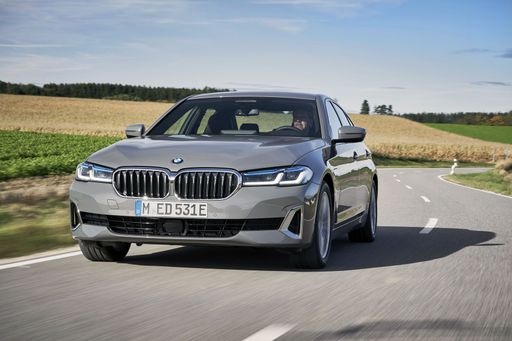
BMW 5 Series Saloon
Costs and Consumption
View detailed analysis
Engine and Performance
View detailed analysis
Dimensions and Body
View detailed analysis
BMW 5 Series Saloon
The BMW 5 Series Saloon blends executive poise with a driver's instinct, delivering a supple, refined cabin and a chassis that prefers composed authority over bravado. For buyers who want a grown-up commuter that still enjoys a twisty road, it’s the kind of car that keeps your colleagues impressed and your weekend grin intact.
details
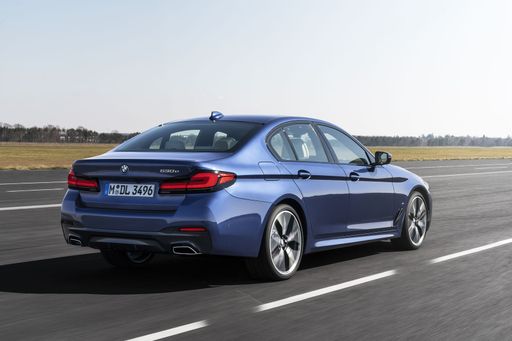
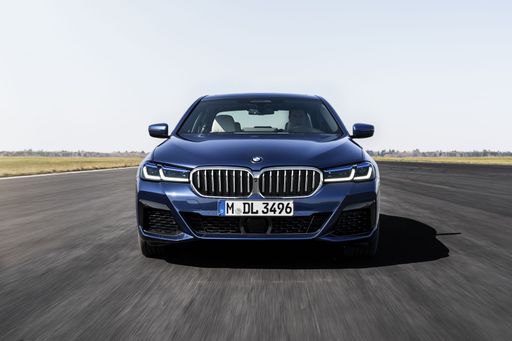
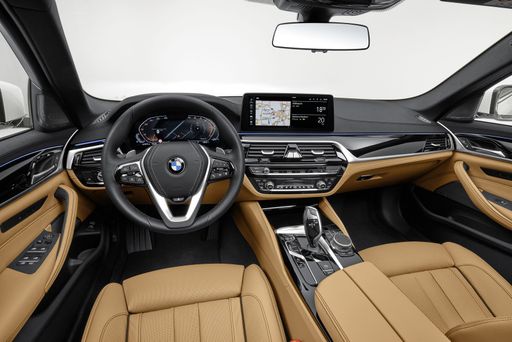
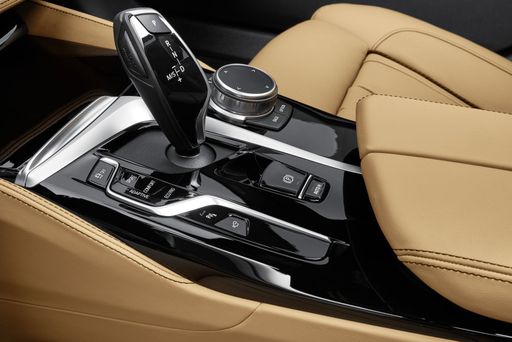
Volvo V90
The Volvo V90 blends Scandinavian elegance with estate practicality, delivering a composed ride and an interior that's both luxurious and perfectly sensible. Packed with clever storage and top-flight safety kit, it's the choice for buyers who want to look classy while hauling life's chaos — without making a fuss about it.
details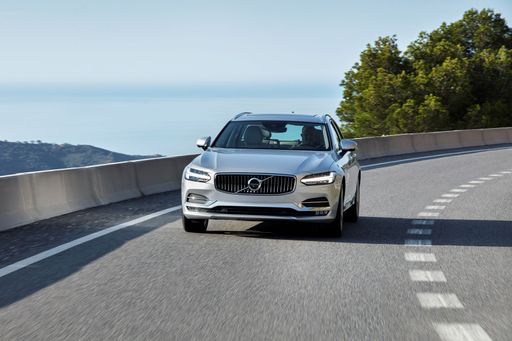
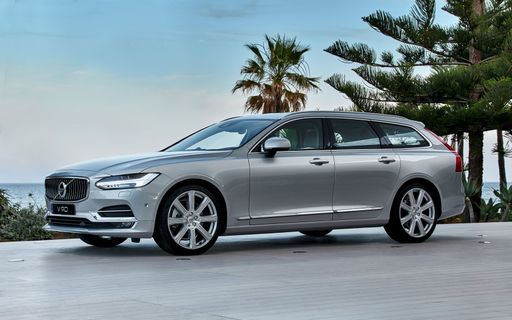
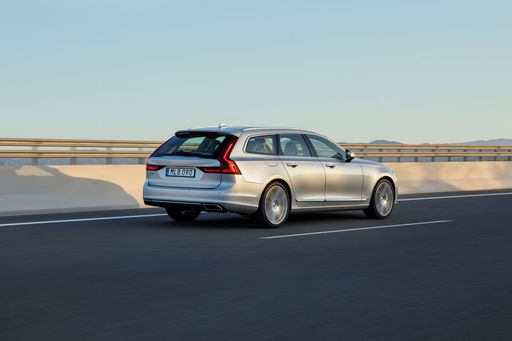
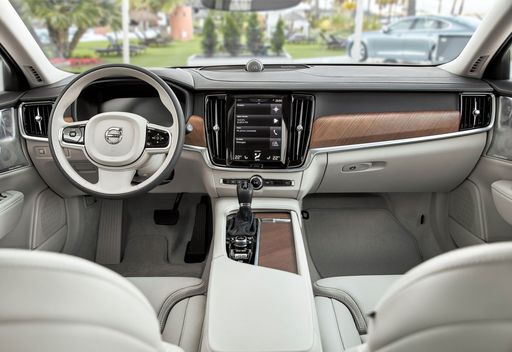
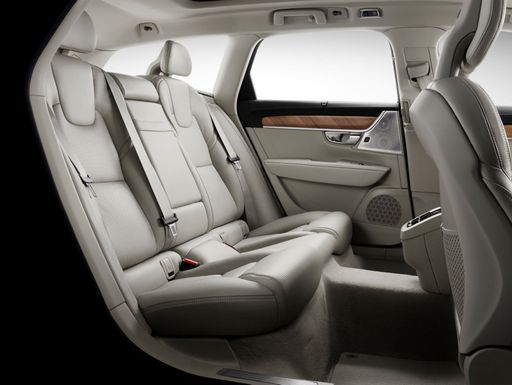

|

|
|
|
|
Costs and Consumption |
|
|---|---|
|
Price
50800 - 123800 £
|
Price
62300 - 71700 £
|
|
Consumption L/100km
2.1 - 5.8 L
|
Consumption L/100km
0.80 L
|
|
Consumption kWh/100km
-
|
Consumption kWh/100km
-
|
|
Electric Range
68 - 105 km
|
Electric Range
88 km
|
|
Battery Capacity
18.6 - 19.4 kWh
|
Battery Capacity
14.70 kWh
|
|
co2
48 - 152 g/km
|
co2
18 g/km
|
|
Fuel tank capacity
60 L
|
Fuel tank capacity
60 L
|
Dimensions and Body |
|
|---|---|
|
Body Type
Sedan
|
Body Type
Estate
|
|
Seats
5
|
Seats
5
|
|
Doors
4
|
Doors
5
|
|
Curb weight
1800 - 2510 kg
|
Curb weight
2075 kg
|
|
Trunk capacity
466 - 520 L
|
Trunk capacity
488 L
|
|
Length
5060 - 5096 mm
|
Length
4945 mm
|
|
Width
1900 - 1970 mm
|
Width
1879 mm
|
|
Height
1510 - 1515 mm
|
Height
1472 mm
|
|
Max trunk capacity
-
|
Max trunk capacity
1454 L
|
|
Payload
430 - 600 kg
|
Payload
515 kg
|
Engine and Performance |
|
|---|---|
|
Engine Type
Diesel MHEV, Petrol MHEV, Plugin Hybrid
|
Engine Type
Plugin Hybrid
|
|
Transmission
Automatic
|
Transmission
Automatic
|
|
Transmission Detail
Automatic Gearbox
|
Transmission Detail
Automatic Gearbox
|
|
Drive Type
Rear-Wheel Drive, All-Wheel Drive
|
Drive Type
All-Wheel Drive
|
|
Power HP
197 - 727 HP
|
Power HP
398 - 455 HP
|
|
Acceleration 0-100km/h
3.5 - 7.5 s
|
Acceleration 0-100km/h
4.8 - 5.5 s
|
|
Max Speed
225 - 250 km/h
|
Max Speed
180 km/h
|
|
Torque
330 - 1000 Nm
|
Torque
659 - 709 Nm
|
|
Number of Cylinders
4 - 8
|
Number of Cylinders
4
|
|
Power kW
145 - 535 kW
|
Power kW
293 - 335 kW
|
|
Engine capacity
1995 - 4395 cm3
|
Engine capacity
1969 cm3
|
General |
|
|---|---|
|
Model Year
2023 - 2025
|
Model Year
2024
|
|
CO2 Efficiency Class
D, E, B, C
|
CO2 Efficiency Class
B
|
|
Brand
BMW
|
Brand
Volvo
|
What drivetrain options does the BMW 5 Series Saloon have?
Available configurations include Rear-Wheel Drive or All-Wheel Drive.
The prices and data displayed are estimates based on German list prices and may vary by country. This information is not legally binding.
